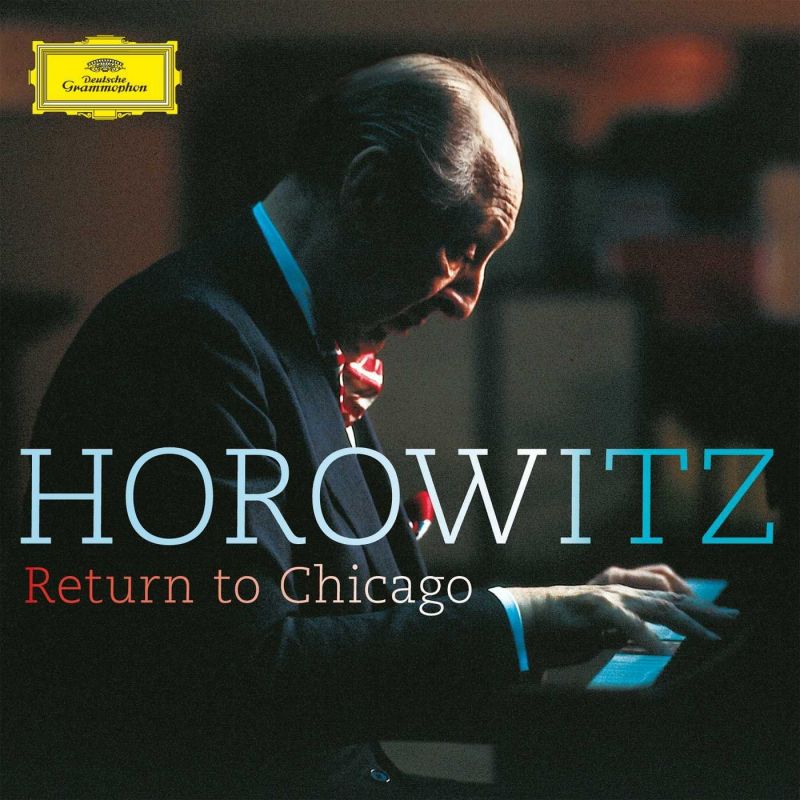Vladimir Horowitz: Return To Chicago
View record and artist detailsRecord and Artist Details
Composer or Director: Vladimir Horowitz, Alexander Scriabin, Franz Liszt, Moritz Moszkowski, Robert Schumann, Wolfgang Amadeus Mozart, Fryderyk Chopin, Domenico Scarlatti
Genre:
Instrumental
Label: Deutsche Grammophon
Magazine Review Date: 01/2016
Media Format: CD or Download
Media Runtime: 122
Mastering:
DDD
Catalogue Number: 479 4649GH2

Tracks:
| Composition | Artist Credit |
|---|---|
| Sonatas for Keyboard Nos. 1-555, Movement: E (L23) |
Domenico Scarlatti, Composer
Domenico Scarlatti, Composer Vladimir Horowitz, Composer |
| Sonatas for Keyboard Nos. 1-555, Movement: E (L224) |
Domenico Scarlatti, Composer
Domenico Scarlatti, Composer Vladimir Horowitz, Composer |
| Adagio |
Wolfgang Amadeus Mozart, Composer
Vladimir Horowitz, Composer Wolfgang Amadeus Mozart, Composer |
| Rondo |
Wolfgang Amadeus Mozart, Composer
Vladimir Horowitz, Composer Wolfgang Amadeus Mozart, Composer |
| Sonata for Piano No. 10 |
Wolfgang Amadeus Mozart, Composer
Vladimir Horowitz, Composer Wolfgang Amadeus Mozart, Composer |
| (3) Pieces, Movement: No. 1, Etude in C sharp minor |
Alexander Scriabin, Composer
Alexander Scriabin, Composer Vladimir Horowitz, Composer |
| (12) Etudes, Movement: No. 12 in D sharp minor |
Alexander Scriabin, Composer
Alexander Scriabin, Composer Vladimir Horowitz, Composer |
| Arabeske |
Robert Schumann, Composer
Robert Schumann, Composer Vladimir Horowitz, Composer |
| Années de pèlerinage année 2: Italie, Movement: Sonetto 104 del Petrarca |
Franz Liszt, Composer
Franz Liszt, Composer Vladimir Horowitz, Composer |
| Soirées de Vienne: 9 Valses caprices d'après Schubert, Movement: No. 6 in A minor (first edition) |
Franz Liszt, Composer
Franz Liszt, Composer Vladimir Horowitz, Composer |
| (4) Scherzos, Movement: No. 1 in B minor, Op. 20 (1831-32) |
Fryderyk Chopin, Composer
Fryderyk Chopin, Composer Vladimir Horowitz, Composer |
| Mazurkas (Complete), Movement: No. 41 in C sharp minor, Op. 63/3 (1846) |
Fryderyk Chopin, Composer
Fryderyk Chopin, Composer Vladimir Horowitz, Composer |
| Mazurkas (Complete), Movement: No. 7 in F minor, Op. 7/3 (1831) |
Fryderyk Chopin, Composer
Fryderyk Chopin, Composer Vladimir Horowitz, Composer |
| Kinderszenen, Movement: Träumerei |
Robert Schumann, Composer
Robert Schumann, Composer Vladimir Horowitz, Composer |
| (8) Characteristic Pieces, Movement: No. 6, Etincelles |
Moritz Moszkowski, Composer
Moritz Moszkowski, Composer Vladimir Horowitz, Composer |
Author: Harriet Smith
No one could imitate anything Horowitz did, and that’s particularly true of his Scarlatti, which combines lightness of action and the subtlest of pedalling: the sharp angles of Kk380 are preserved without a hint of aggression, while Kk135 is filled with a quiet playfulness, the brilliance almost understated.
Schumann’s Arabeske, new to his DG output though by no means new to his discography as a whole, has a pearlescent beauty, a reactivity that gives new tints to the main theme each time it reappears. In Liszt’s Petrarch Sonnet No 104, too, there’s an assurance to the way it unfolds that’s utterly compelling, its dying moments truly moving, even if it does get a tad tangled in some of the more physically demanding passages. And the Sixth Soirée de Vienne is full of rapturous beauties (just sample the murmured filigree beginning at 3'59"). Horowitz’s Chopin is not to all tastes, being too romantic for some, but it’s hard to resist his Op 7 No 3 Mazurka, which is lent a febrile instability. The First Scherzo, though, is a bit of a car crash that even moments of wondrous singing tone can’t rescue. The audience applause is as warm as ever – perhaps out of relief as much as anything else. Ah yes, the audience: late October in the Windy City is perhaps inevitably going to mean a lot of snuffles, sneezes and coughs, and they form an unwelcome counterpoint to the proceedings on stage.
Mozart, Horowitz reveals in a radio interview with Norman Pellegrini recorded the day before his Chicago recital, had been a great love all his life but it was only latterly that he’d felt ready to share it on the concert platform. If others find a more dolorous quality to the B minor Adagio, Horowitz is in his element in the D major Rondo, which glistens and glints with ever-changing hues. And he turns the first movement of the C major Sonata, K330, into a veritable opera in miniature. The Scriabin C sharp minor Etude, Op 2 No 1, is beautifully sung, while the Moszkowski ‘Etincelles’ – long a favourite encore – has enormous spirit, if not quite the carefree freedom of earlier incarnations, not least the 1975 Carnegie Hall recital (RCA). With good sound and a fascinating booklet essay, this is another compelling addition to the vast Horowitz legacy.
Discover the world's largest classical music catalogue with Presto Music.

Gramophone Digital Club
- Digital Edition
- Digital Archive
- Reviews Database
- Full website access
From £8.75 / month
Subscribe
Gramophone Full Club
- Print Edition
- Digital Edition
- Digital Archive
- Reviews Database
- Full website access
From £11.00 / month
Subscribe
If you are a library, university or other organisation that would be interested in an institutional subscription to Gramophone please click here for further information.




